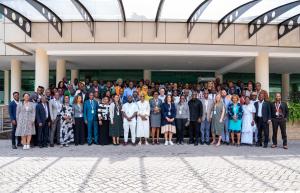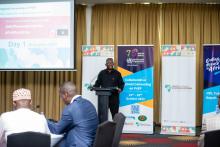Stakeholders commit to scaling up the use of HIV pre-exposure prophylaxis
Accra, Ghana - Stakeholders from 25 member states in the African region convened from 16th to 18th October 2023 in Accra, Ghana to engage in a Pre-Exposure Prophylaxis (PrEP) implementation review workshop and develop country action plans to enhance and expand the region's PrEP programming.
The collaborative regional convening brought together donors, policymakers, health service providers, researchers, and advocates from adolescents and young people, and key populations to share experiences and discuss barriers to scaling up PrEP utilization and shared best practices in PrEP programming.
The discussions focussed on the building capacity of member states for the adoption of PrEP innovations and service delivery approaches to scale up PrEP accessibility within the African region.
“PrEP addresses an existing gap and broadens the spectrum of preventative measures available to individuals facing a significant risk of contracting HIV,” said Dr Frank Lule, Medical Officer MCAT Ghana. “There is an urgent need to increase the adoption and implementation of PrEP as an effective antiretroviral (ARV)-based prevention strategy for HIV prevention within the African region.”
PrEP reduces the risk of acquiring HIV by more than 90 per cent. It is an important prevention tool to reach those at substantial risk of acquiring HIV and least reached by existing services. The effective use of PrEP products can reinvigorate the HIV prevention response across the African region.
Every week, approximately 4,000 adolescent girls and young women contract HIV. In 2022, women and girls (of all ages) in sub-Saharan Africa constituted 63% of all newly reported HIV infections in the region. The HIV pandemic continues to impact key populations more than the general population. In 2022, compared with adults in the general population (aged 15-49 years), HIV prevalence was 11 times higher among gay men and other men who have sex with men, four times higher among sex workers, seven times higher among people who inject drugs, and 14 times higher among transgender people.
“Stronger collaborations between the World Health Organization, UNAIDS, funding partners, Civil Society, and communities will promote the expansion of PrEP initiatives,” said Michelle Rodolph, Technical Officer, WHO Global Programme on HIV, Hepatitis, and STIs.”
WHO first recommended oral PrEP in 2015, and now more than 95% of countries in the African region have policies on oral PrEP. Therefore, to scale up PrEP and reach levels of coverage that translate into public health impact, there is the need to focus on reaching key populations with HIV testing and prevention services”, she concluded.
Many countries in the African region are implementing PrEP at scale and need further support to develop inclusive and innovative people-centered PrEP interventions into their national HIV strategies.
“At the Bill & Melinda Gates Foundation, we are keen to see existing and new PrEP products made available to those who would most benefit from HIV prevention interventions,’’ said Siobhan Malone, Senior Program Officer HIV and TB Team, Bill and Melinda Gates Foundation. “We support research in a number of countries to inform and improve focused delivery efforts that meet the needs of those for whom PrEP is essential” she emphasized.
Participants discussed implementation barriers to PrEP scale-up, including stigma, and discrimination towards PrEP utilization, use of PrEP-IT Tool, targeted programming for PrEP, and its adoption into national policies and guidelines within the context of combination prevention, not forgetting condom programming. They also emphasized the need to integrate PrEP into national programs, with public-private sector engagement, and to further involve communities to increase demand and improve service delivery. Other issues of concern that need to be addressed include drug monitoring for PrEP users.
The meeting was coordinated by SSLN, UNAIDS, and WHO. Attendees included representatives from Ministries of Health, National AIDS Commissions, country and regional partners, community and civil society, and regional and country colleagues from WHO and UNAIDS.


